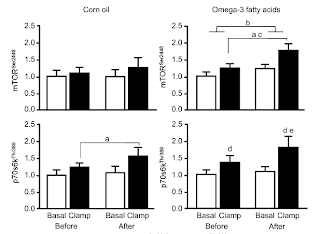1.86 g EPA + 1.5g DHA Augment the Hyperaminoacidemia-Hyperinsulinemia–induced Increase in the Rate of Muscle Protein Synthesis
MPS, the acronym for "muscle protein synthesis", certainly is an eye-catchers for everyone interested in building sleeve bursting arms. Obviously, the at which (dietary) proteins are incorporated into muscle tissue is an important factor in how much and how fast your muscles will grow.
Scientists from the Washington University, School of Medicine (Smith. 2010) have now conducted a randomized placebo controlled trial on the effect of omega-3 (4g/day Lavazza(TM) = 1.86 g EPA + 1.5g DHA) supplementation on muscle protein synthesis in older adults. And despite the fact that omega-3s on their own had no effect on MPS, the consumption of supplemental omega-3s significantly augmented the MPS-response to Hyperaminoacidemia and Hyperinsulinemia.
The results of this study may also shed some light on a 2003 study by Fearon, et.al. (Fearon. 2009), who found that adding fish oil to a protein supplement increased lean mass gains in patients with cancer cachexia.
While, in view of these results, adding some fish oil caps to your post-workout protein + carb drink seems to be a beneficial, yes, almost obligatory idea, I personally feel that the verdict on the effects of fish oil (especially in particularly high doses) in healthy, or even athletic parts of the population is still out there. Anyway, I will keep you posted.
On a side note: Notice that this study uses a much more "favorable" (my point of view), low EPA:DHA ratio compared to the study I reported on a few days ago, which found no influence of fish oil supplementation on weight and fat loss in obese individuals.
Scientists from the Washington University, School of Medicine (Smith. 2010) have now conducted a randomized placebo controlled trial on the effect of omega-3 (4g/day Lavazza(TM) = 1.86 g EPA + 1.5g DHA) supplementation on muscle protein synthesis in older adults. And despite the fact that omega-3s on their own had no effect on MPS, the consumption of supplemental omega-3s significantly augmented the MPS-response to Hyperaminoacidemia and Hyperinsulinemia.
 |
| Figure 1: Mean (6SEM) concentrations (arbitrary units) of mTORSer2448 and p70s6kThr389 during basal, postabsorptive conditions and during the hyperaminoacidemic-hyperinsulinemic clamp before and after 8 wk of supplementation with either corn oil (n = 7) or omega-3 fatty acids (n = 8). (Smith. 2010) |
While, in view of these results, adding some fish oil caps to your post-workout protein + carb drink seems to be a beneficial, yes, almost obligatory idea, I personally feel that the verdict on the effects of fish oil (especially in particularly high doses) in healthy, or even athletic parts of the population is still out there. Anyway, I will keep you posted.
On a side note: Notice that this study uses a much more "favorable" (my point of view), low EPA:DHA ratio compared to the study I reported on a few days ago, which found no influence of fish oil supplementation on weight and fat loss in obese individuals.


